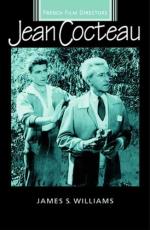|
This section contains 3,352 words (approx. 12 pages at 300 words per page) |

|
SOURCE: Grayson, Susan B. “The Other as Self in Cocteau's Les Enfants terribles.” Perspectives on Contemporary Literature 12 (1986): 43-50.
In the following essay, Grayson argues that the children in Les Enfants terribles represent a pre-Oedipal refusal to acknowledge the separation of self from other.
Traditional interpretations of Les Enfants terribles, Cocteau's intriguing and personal work, note the Children's compelling beauty, the unreal spectacle of their living arrangements, and the sexual flavor of their uncompromising adolescence. A Lacanian reading, however, reveals Les Enfants as a different tale. The Children's twinship represents not a paean to youth but a primitive confusion of Self and Other, and their verbal games and treasured objects bespeak an undifferentiated, pre-Oedipal level of interaction. In effect, Paul and Elisabeth remain outside the requirements of maturity by refusing to move into adult language which splits subject and object.
The blur between Self and Other places this novel...
|
This section contains 3,352 words (approx. 12 pages at 300 words per page) |

|


